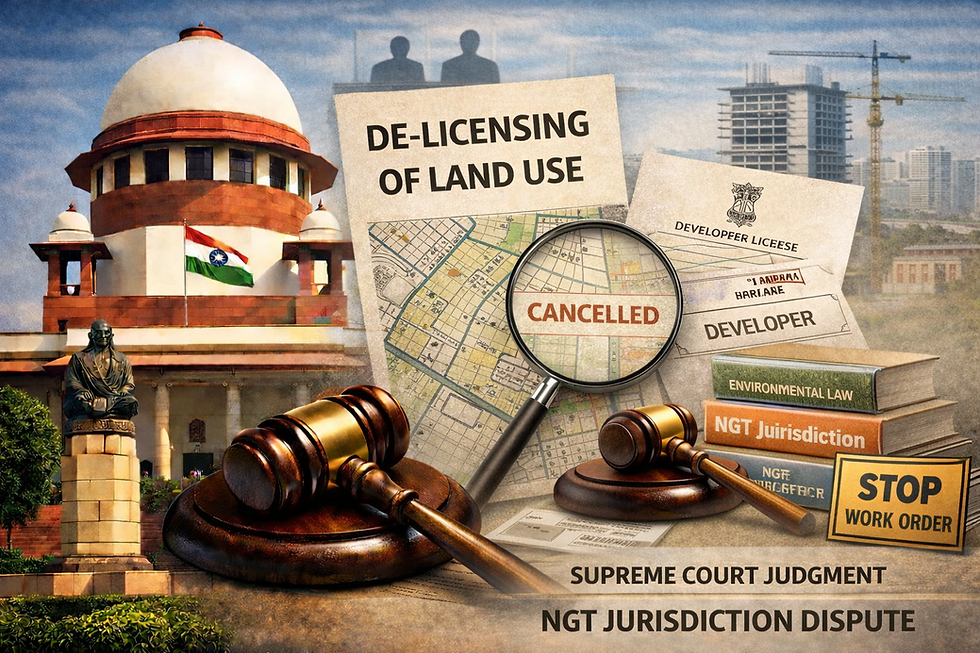Supreme Court Holds Criminal Courts Cannot Alter Own Judgments
- Chintan Shah

- Sep 2, 2025
- 3 min read
On 27 August 2025, a Constitution Bench led by Chief Justice B.R. Gavai and Justice Augustine George Masih reaffirmed a cornerstone of criminal procedure: once a criminal court has signed its judgment, it becomes functus officio and cannot revisit that decision, except in the narrow circumstances expressly provided by statute. The Court struck down a Delhi High Court order that had recalled its earlier ruling and revived perjury proceedings in a corporate dispute — holding that such a recall was barred by Section 362 of the Code of Criminal Procedure, 1973 (CrPC).
The Court’s Holding in Brief
Section 362 CrPC’s embargo is absolute. No criminal court may alter or review its signed judgment or final order except to correct clerical or arithmetical mistakes, or where another statute expressly permits.
No circumvention via inherent powers. The bench warned that Section 482 (the High Court’s supervisory jurisdiction) or other procedural devices cannot be deployed to bypass Section 362’s clear bar.
Narrow exceptions survive. Only limited grounds recognised in precedent — fraud, jurisdictional defect, or non-representation of essential parties — can justify reopening.
The ruling restores certainty to criminal adjudication by preventing repeated reopening of cases after final judgment.
Statutory Anchor: Section 362 and Functus Officio
Section 362 CrPC provides:
“No Court, when it has signed its judgment or final order disposing of a case, shall alter or review the same except to correct a clerical or arithmetical error.”
This text embodies the doctrine of functus officio — once a court has discharged its judicial function by signing a judgment, it has exhausted its authority over that decision. The Supreme Court stressed that this statutory finality safeguards the rule of law by closing the door to indefinite litigation over the same criminal dispute.
Recognised Exceptions
The Court distilled exceptions from prior precedent and statutory carve-outs, emphasising that they are “rare” and “compelling,” not a general licence to reopen cases:
Statutory authorisation: where a specific law permits review or modification.
Lack of jurisdiction: where the original judgment was rendered without authority.
Fraud or collusion: where the decision was procured illegally.
Substantial prejudice from court’s omission: only if the issue could not have been raised earlier.
Non-representation: where a death or lack of notice meant a necessary party was unrepresented.
Why the Ruling Matters
Reinforcing Finality
Criminal litigation directly concerns liberty and must end with certainty. Endless reopening undermines stability and invites abuse. By enforcing Section 362’s strict bar, the Court curtails serial challenges and promotes closure.
Constraining Procedural Creativity
Litigants have sometimes tried to use civil review mechanisms or invoke Section 482’s “inherent powers” to revisit criminal judgments. The Court made clear such strategies are impermissible. Criminal procedure is self-contained, and its explicit limits cannot be side-stepped.
Impact on Defence and Prosecution
For practitioners, the operational message is clear:
Errors must be addressed via appeal, revision, or statutory remedies, not by recall after judgment.
Timeliness is critical: once the window for statutory remedies closes, the judgment ordinarily attains finality.
The listed exceptions apply only in rare, exceptional cases — not as routine fallbacks.
Clarifying Section 482’s Role
The judgment resolves a long-running tension: while Section 482 grants High Courts broad powers to prevent abuse of process, it cannot override Section 362. Supervisory powers remain significant, but not omnipotent — the statutory bar prevails.
Case Illustration: Vikram Bakshi v. R.P. Khosla
The immediate dispute was mundane but illustrative. In 2021, the Delhi High Court had recalled its dismissal of a perjury petition after the petitioner argued that a related company petition’s withdrawal had not been disclosed earlier. The Supreme Court found this alleged “new fact” was already available and that the recall amounted to an impermissible substantive reopening. The High Court’s order was set aside, and its original judgment restored.
Jurisprudential Outlook
The ruling calibrates finality and fairness. Finality ensures closure, protects liberty against endless litigation, and preserves judicial discipline. Fairness is preserved by maintaining narrowly-defined exceptions where fraud, jurisdictional error, or injustice is undeniable.
Conclusion
The Supreme Court’s 27 August 2025 decision is a clarifying reaffirmation: Section 362 CrPC closes the door on criminal courts revisiting their own signed judgments, save for the rarest exceptions.



Comments